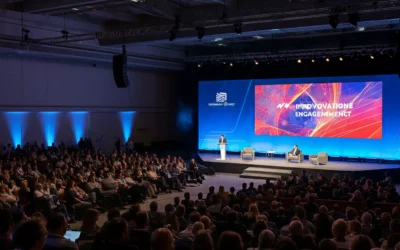Whether you’re organizing a small team meeting or a national conference, effective meeting management can make or break the success of your event. For event managers and planners, mastering the art of meeting management ensures that events run smoothly, achieve their objectives, and leave lasting impressions on attendees.
This article will help you understand what meeting management is, why it’s critical for businesses, and provide actionable tips to plan and execute exceptional events.
What is Meeting Management?
At its core, meeting management involves planning, organizing, and facilitating meetings or events effectively to achieve a specific purpose. It covers everything from setting clear meeting objectives, choosing the right venue, and creating detailed agendas to managing participant interactions and tracking outcomes.
Meeting management applies not only to corporate gatherings but also to a wide variety of events, including trade shows, conferences, training workshops, and social functions. A well-managed meeting aligns with business goals, fosters collaboration, and provides value for every participant.
For event professionals, meeting management is a crucial competency—serving as the foundation for seamless event execution.
Key Components of Meeting Management
- Objective Setting: Defining the goals and desired outcomes of a meeting before planning begins.
- Agenda Creation: Structuring a meeting with specific time slots for discussions, presentations, and activities.
- Stakeholder Communication: Coordinating with attendees, speakers, vendors, and other key players.
- Logistics Oversight: Booking venues, arranging accommodations, managing travel plans, and more.
- Post-Event Evaluation: Measuring success based on attendee feedback and event objectives.
A professional event planner knows that meeting management goes beyond just logistics—it’s about crafting a thoughtful experience that achieves its intended purpose while leaving a memorable impression.
Why is Meeting Management Crucial for a Company?
1. Drives Business Goals
Meetings are often the platform for decision-making, strategy alignment, and collaboration. Poorly managed meetings can hinder productivity and deplete resources, while well-run meetings ensure that every participant is aligned with the company’s strategic priorities.
For example, during a product launch event, effective meeting management ensures that timelines are met, messaging is consistent, and participants are clear about their roles in the company’s goals.
2. Saves Time and Resources
Time is one of the most valuable assets in any organization. Poorly managed meetings waste time with unclear objectives, off-topic discussions, and inefficiencies. Streamlined meeting processes save countless hours and help businesses avoid unnecessary expenses.
By identifying and addressing logistical or communication pitfalls during planning, event professionals can maximize ROI and ensure smooth operations.
3. Enhances Collaboration and Engagement
Meetings bring together diverse stakeholders, from internal team members to external partners. Effective meeting management ensures that everyone is engaged, actively contributing, and working towards a shared goal—fostering stronger connections and collaboration.
For example, at industry trade shows, providing structured opportunities for networking and collaboration can help attendees form valuable partnerships that drive mutual business value.
4. Builds Brand Reputation
A well-executed event reflects positively on a company’s image. Whether it’s a sleek corporate meeting or a high-energy conference, the professionalism of an event tells attendees a story about the brand and its values. Meeting management ensures that every detail aligns with the company’s image and marketing goals.
Tips for Planning and Executing Powerful Events
To make meaningful strides in meeting management, event planners and managers need to approach every event with meticulous attention to detail and strategic foresight. Below are actionable tips to deliver outstanding events every time.
1. Start with a Clear Purpose
Every successful meeting or event begins with a strong purpose. Ask yourself, “What does this meeting aim to accomplish?” Whether it’s team alignment, problem-solving, or client engagement, defining the objectives will guide every decision you make moving forward.
Pro Tip: Translate your goals into measurable metrics to assess the event’s success, such as attendee satisfaction scores or conversion rates from leads generated at the event.
2. Create a Detailed Agenda
A structured agenda is one of the simplest yet most effective tools for seamless meetings. Allocate time slots for each topic or activity and share the agenda with all participants beforehand to manage expectations.
Remember to build in time for Q&A sessions and informal discussions, as these moments often yield the most impactful ideas and feedback.
3. Leverage Technology
Modern meeting management software can drastically enhance efficiency. Platforms like Zoom, Microsoft Teams, and Hopin allow event planners to manage virtual or hybrid events effortlessly. Additionally, project management apps like Trello, Monday.com, or Eventbrite simplify task delegation, registration, and communication.
Advanced Tools:
- Polls and Surveys: Use tools like Slido or Mentimeter for real-time input from attendees.
- Attendee Tracking: RFID badges or facial recognition tech can measure attendance and engagement.
4. Prioritize Accessibility and Inclusivity
The most successful events prioritize accessibility for all participants. Choose venues that comply with accessibility guidelines, provide virtual options for hybrid events, and cater to dietary preferences for catering.
Making attendees feel valued and included not only improves their experience but enriches the collaborative potential of the event.
5. Focus on Logistics and Contingency Planning
From selecting the right venue and managing registrations to confirming speaker arrangements, event logistics require a keen eye for detail. Always have a contingency plan in place to mitigate disruptions, such as IT failures or last-minute cancellations.
Example: Two weeks before the event, reconfirm venue availability, catering orders, and audio-visual equipment functionality.
6. Engage Attendees Before, During, and After the Event
Enhance participant engagement from the moment invitations are sent. Use teasers, email communications, or social media campaigns to build excitement before the event. During the meeting, encourage dialogue through thoughtful Q&A sessions. Finally, send follow-ups with highlights, survey links, or next-step action plans.
7. Evaluate and Optimize
After every meeting, assess how effectively it met its objectives. Distribute feedback surveys to attendees and debrief with your team to identify areas for improvement. Meeting management should be a continuous cycle of planning, execution, and refinement.
Pro Tip: Analyzing feedback from both attendees and staff members helps identify overlooked pain points or opportunities for innovation.
Achieve Exceptional Results Through Strong Meeting Management
Meeting management is about crafting meaningful, efficient, and purposeful gatherings that leave a lasting impact on attendees. By defining clear goals, leveraging technology, and prioritizing attendee experience, event managers can elevate meetings from ordinary to exceptional.
If you’re looking for more expert insights or need professional support in planning your next big event, contact our team today. With years of experience in event management, we specialize in helping businesses thrive through well-executed meetings and events.
Start planning your next event today—because every great meeting starts with great management.
You might also like…
Top 10 U.S. Meeting Destinations for 2026
Successful corporate events don’t just happen — they’re built on smart decisions, starting with...
The Trade Show Prep Guide: Boost ROI Like a Pro
Trade shows are a powerful way to elevate your brand's visibility, connect with potential...
President’s Club 2026 Ultimate Gift Guide
Luxury, Personalization, and Impact for Unforgettable Incentive Travel President’s Club isn’t just...
The Role of Corporate Event Managers is Evolving
Corporate events aren’t what they used to be. Gone are the days of basic cocktail hours and...
Revitalizing Sales Kickoffs: Strategic Insights for 2026
Gone are the days when Sales Kickoffs (SKOs) were just annual corporate pep talks. Today's SKOs...
Planning for Performance: The 2026 Guide to Mastering Incentive Travel
Here's Why Incentive Travel is Your Secret Weapon in 2026... Gone are the days when incentive...







